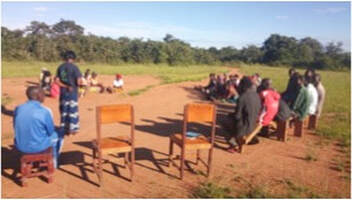Written by CorpsAfrica/Malawi Volunteer Ms. Dorothy Mapira
Many times we feel like we can do it on our own. We rarely give a listening ear to those that we see as inferior to us. We think they cannot contribute positively to what we are doing; perhaps we feel we are better off without them. This mindset is what has killed most of our work, it has dragged us down to a place where we wish we should not have done what we did. Of course, just a few would think through their failures and find ways of bailing themselves out. Sometimes letting go of our ego to achieve a common goal will be more worth it.
As the saying goes, ‘If you want to go fast, go alone. If you want to go far, go together.’ Maybe sometimes the reason we are so strict and reserved to work alone is the fact that we want to do things faster. The question might be, how far can we go if we want to do things faster. I am not saying we can’t always do things on our own, but there are some things that require added effort. One of those things is development work. You really need to join hands to achieve this and more still if you are working in a community.
A word that matters most in working with the community is the word engagement. Sally Hassey has defined community engagement as based on the democratic idea that everyone who is affected by an issue that affects his or her community should have a say in the decision-making around it. This has a long impact on whatever project implemented in the community because it ensures sustainability.
You cannot certainly work in the community without engaging the people, if you want your work to be acceptable and received by all, engage them. Let them see the importance of whatever work is to happen in the community and they will surely own it. Most of the time we have missed the importance of involving the community in our projects, we think we can always impose things on them as if they cannot think on their own. Most importantly, we have to know that we are not permanent residents in the communities and we might not fully know what they really need in their community. Perhaps we might object to say that we did a survey before doing what we did, but what if the survey was a top-down approach that did not even center on the people themselves.
Development requires efforts, and better still requires mindset change. If only we could value the people in the village and work with them in identifying the most important development projects with them, we could have seen a better Malawi by now.

